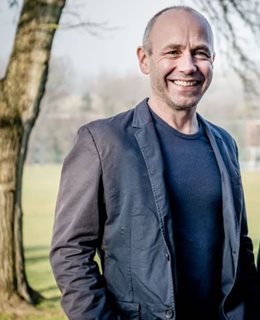
13 Dec The psychology of the ecological crisis
A Professor of Psychology on the relationship between the discipline and the nature of the climate and ecological crisis.
Dr Matthew Adams sees no social change more profound than the ecological crisis. It began to trouble him in the mid-2000s, around about the same time he began to notice the myriad of ways he and others avoided thinking and talking about it. Born into a working-class family, he was first to go into higher education. He now holds a position as Principal Lecturer in Psychology at the University of Brighton.
He was first introduced to psychology whilst studying A Level sociology. It was only one strand of his undergraduate degree and the unique syllabus, which focused on maverick, feminist, critical and outsider psychology, all in conjunction with sociology, cultural studies and critical theory, had him hooked: “It felt like my eyes were being opened to a rich vein of understanding the world.”
This interesting route into psychology is no doubt what has shaped his identity today – both as an individual and teacher. His research interests have been varied. He has shifted focus from the role of social forces and social change in shaping identities to a more specific concentration on ecological crisis and how we make sense of it in recent years.
At the start of his career, psychology as a discipline had very little to say about the issue, it focused on behaviour change models which he didn’t think were particularly useful. He saw psychology as something that could “help contribute to a culture that more openly discloses and explores the nature of that crisis, what it means to be us and how we might begin to meaningfully address it.” He saw an opportunity to “highlight existing and new ways of engaging with each other, including non-human others, and the nature world.”
“I think we need to facilitate a new convergence and consilience of natural and social sciences, politics and more – this has to happen at University level and be supported by policy, but it also has to happen at primary and secondary – a new kind of critical citizenship studies.”
This comes with challenges: “The biggest obstacles are the core alliances and related inertia of incumbent powers – largely political and corporate, at global and local levels, maintained through everyday connections as much as policies and propaganda.” To focus all our attention on psychological and social barriers is a misnomer, he says “we cannot let the social, structural and political forces remain taken-for-granted in the background, as fixed, and focus all our attention on the individual or ‘nudging’ social norms.”
Psychological and social structures are linked in this sense – how we respond individually, how we think and feel about the climate crisis – they are inseparable from the workings of society and the culture we live in.
“The dominant stories of our culture make it difficult to imagine or discuss a different societal set-up other than the current one (i.e. capitalism) or some kind of apocalypse.” At a personal level, “we have defence mechanism that helps us feel less anxious about the climate crisis but stops us addressing it,” socially, “we often have a kind of tacitly agreed silence about these issues – a socially organised form of defence mechanism” and culturally, “we have advertising, media and general surplus of opinions which can encourage not knowing or acting on the climate crisis.” Disciplines like psychology often encourage individual behaviour change as a solution – “arguably another kind of defence mechanism.”
Matthew has an interesting approach to teaching, one that led him in 2017 to obtain the University of Brighton Award for Excellence in Facilitating Learning, after being nominated by undergraduate psychology students.
“I’m uncomfortable with the idea of lecturers as experts, handing down information for students to accept and regurgitate. For me learning is about coming to new understandings, making sense of our own and other’s experience, in dialogue with others. The more we treat student cohorts as a community of intelligent, inquisitive individuals trying to address real-world problems in which they are invested, the more they enjoy and engage.”
This piece is one of three I have chosen to submit to the BBC Student Journalist of the Year competition. The criteria is as follows:
- Embody the BBC values of impartiality, trustworthiness and excellence.
- Serve the needs and interests of a student audience.
- Be three examples of work produced during the time on the module – and they had to be original.
- Be published in media aimed either solely or predominantly at a student audience.
Dr Matthew Adams. Photo: Courtesy of University of Brighton.

